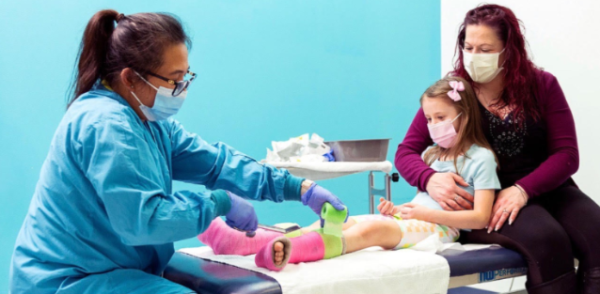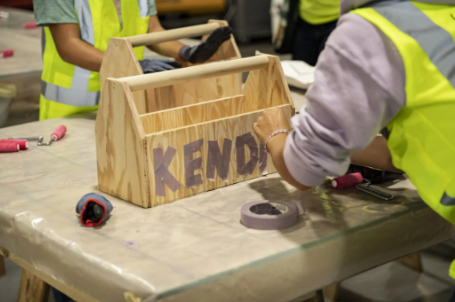 (Picture of Michele Monteclaro with a patient.)
(Picture of Michele Monteclaro with a patient.)
A registered orthopedic technician or technologist is a professional who provides technical support to physicians who work with doctors to treat bones, muscles, congenital deformities, and other issues. They make casts, splints, and braces and help with surgery prep. I interviewed Michele Monteclaro, a fellow orthopedic technician, and she talked about what her life is like as a registered orthopedic technician.
WHAT INSPIRED YOU TO PURSUE A CAREER AS AN ORTHOPEDIC TECHNOLOGIST?
“At first, I just wanted to elevate my career, but then I started loving my job because it’s rewarding to see the results when my patients don’t need to have surgery or when they heal well.”
DID YOU HAVE ANY PERSONAL EXPERIENCES THAT INFLUENCED YOUR DECISION TO BECOME A REGISTERED ORTHOPEDIC TECHNOLOGIST?
“No, I did not have any.”
HOW DO YOU REMAIN CALM WHEN YOU’RE IN A DIFFICULT SITUATION?
“I have to remain calm because I want my patients to see that I can perform my job. If I freak out, they’re going to freak out more. If I had to step away, I would step away just to clear my thoughts and make sure that what I’m doing is proper and professional.”
WHAT DO YOU LIKE ABOUT BEING AN ORTHOPEDIC TECHNOLOGIST?
“What I like about my job is teaching. I teach new staff. I teach medical residents, physician assistants, and medical students. I go to community clinics and teach them how to splint. What is a splint? A splint is a temporary immobilization that is made with some soft padding and some fiberglass. I also teach my patient’s parents how to splint their children when they fracture their bones. This is particularly true for patients who have brittle bone disease. Can you talk a little more about brittle bone disease? We call it O.I., or osteogenesis imperfecta; those are the patients that break their bones very easily. So a lot of times, when parents are aware of their child’s disease, they always know if it is broken. I teach them the techniques on how to immobilize the arm, the leg, or whatever until they see the doctor.”
WHAT ARE THINGS YOU DON’T LIKE ABOUT BEING ORTHOPEDIC TECHNOLOGIST?
“What I don’t like about my job is when the material I need is lacking or if I don’t have the proper materials. It becomes very difficult sometimes to do a good-quality cast if my material is not my preferred material. As well as being short on staff at times. I don’t like it when my patients have to wait because we have a short staff.”
WHAT DOES YOUR DAY LOOK LIKE?
“I wake up at 5:00 a.m. and leave before 6. I have to be at work at 6:00. I work ten hours a day for four days. When I get to work, I check the clinic schedule. I make sure that I have all the materials I need. Not only casting but also braces and all the other stuff I need. When my doctor gives me an order for a cast, I look at the X-rays and plan how I would mold the cast. The patient may need X-rays after the new cast to make sure I corrected the fracture to a better position. I also remove casts and put on braces. I also print the clinic schedule for the next day and plan for it. I usually leave at 5 p.m. or later when it’s busy.”
WHAT ARE THE RISKS OF BEING A REGISTERED ORTHOPEDIC TECHNOLOGIST?
“One of the long-term risks of working as an orthopedic tech for a long period is hearing issues because the cast saw is loud. Another issue is constant musculoskeletal pain from improper posture when we are casting, like lower back pain, shoulder and foot pain, and elbow tendonitis. We can also get wrist and hand injuries from using the cast saw and scissors. I need to get adjusted by a chiropractor once a month.”
WHAT IS THE PAYMENT?
“It depends; if you’re starting, you may start at $25 an hour. When you have skills and work experience, you can make up to $45 an hour or $50.”
ARE THERE ANY MEDICAL BENEFITS?
“Yes. Medical, dental, and vision benefits are free at work, including all dependents. We also get a free Orca card. We have perks and discounts at other places. We have discounts for Apple, Microsoft, and other establishments.”
WHAT IS SOME ADVICE YOU WOULD GIVE TO PEOPLE WHO WANT TO BE IN THIS CAREER?
“Some advice I would give to people who want to be an orthopedic technician as a career is to graduate as a medical assistant. They also need to have some nursing background and know some medical terminology, particularly in orthopedics. Once you are hired, you have to train for three to six months. There’s a lot of detail you need to learn in orthopedics. You need to know your skeletal system and your muscular system.”
In conclusion, if you are interested in pursuing a career to become an orthopedic technician, it can be a beneficial career path. If you enjoy helping people or you are interested in preparing and maintaining equipment, giving assistance to patients, and providing patient care, this will be a good fit for you. Make sure to graduate as a medical assistant, have a medical background, and have knowledge of what you’re doing for this job. Once you start training to become an orthopedic technician through a certificate or an orthopedic technician program, this job requires a strong understanding of orthopedic procedures and amazing technical skills.
SOURCES: https://www.seattlechildrens.org/
Michele Monteclaro











